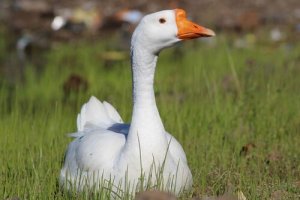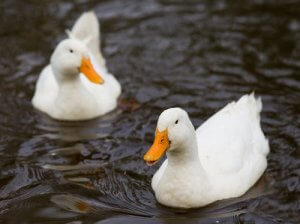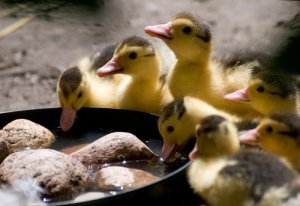Keeping Ducks As Pets: Care and Housing


Written and verified by the lawyer Francisco María García
When a family decides to adopt an animal, keeping ducks as pets probably isn’t the first option that springs to mind. After all, the pet industry is mainly dominated by two species: dogs in the first place, with cats not far behind.
Less conventional, but still very popular options, include rabbits and birds. Others prefer fish or tortoises, while some opt for more exotic, and even dangerous animals, such as snakes, lizards, spiders and scorpions.
In rural areas, ducks usually occupy the same role as chickens, and are mainly kept as poultry. Until recently, keeping ducks as pets would have been almost unheard of. But over the last few years, it has become a huge trend in countries such as the US.
Is it possible to keep ducks as pets?
While it might not be the most traditional option, it is possible to keep ducks as pets. Ducks are really sociable birds, and love playing games and spending time with humans.

If they receive constant attention and training, they can even learn to understand commands, and in some cases, go for walks with their owners.
Those who decide to bring ducks into their home must be aware of the minimum requirements for keeping these birds happy and healthy.
Having a pet means making a life-long commitment to that animal. Once you agree to take on that responsibility, you need to fulfill your duties as a pet owner.
Keeping ducks as pets: the ideal home
These birds can adapt well to domestic life without great difficulty. If, as well as giving them plenty of care and attention, you can give them access to a patio or other outdoor space, so much the better. And if you also have a pond where they can swim and bathe regularly, your ducks will have pretty much everything they need.
Can you keep a duck in an apartment?
This is an option that should never even be considered. There are a number of reasons for this, each of which can have a huge impact on your animals’ welfare.
- Ducks need a large outdoor space where they can walk around and stretch their wings to their hearts’ content. Keeping them shut in 24 hours a day, without any direct exposure to sunlight, can lead to them becoming depressed.
- They also need to be able to swim and bathe regularly. Those that keep ducks in a house or an apartment would need to consider setting up a small plastic swimming pool in the middle of their living room floor.
- Ducks defecate frequently throughout the day and, unlike dogs and cats, there’s no way to house train them. As they walk or swim around, they frequently shake their tails and leave droppings in their wake.
Some people choose to dress their ducks in specially-made bird diapers. But as well as needing frequent changing, they can make the animal uncomfortable.
- Ducks are noisy and energetic creatures. When you stroke their feathers, they’ll reward you with loud squawks of pleasure. After a while, you might find that your neighbors start to complain about the noise.
Keeping a duck as a pet: care and housing
If you’ve already decided to adopt a duck, you’ll need to keep the following aspects in mind:
- Ducks need company. If you decide that these are the pets for you, you may want to adopt a male and female pair, rather than just one.
- During the first month of their lives, ducklings have trouble regulating their body temperature, and won’t be particularly strong swimmers.

During this time, it’s best to keep your ducklings in a safe, enclosed area, away from any cold drafts. Similarly, it’s important to keep a close eye on them while they’re on or near water, as there’s a high risk of drowning.
- By two months old, all their feathers should have grown. You can then start to give them more freedom and give them access to open spaces and water.
- Ideally, your ducks should have free access to a pen where they can shelter from bad weather. This pen should be safely secured at night to minimize the risks from predators.
- They need fresh, clean water. Their water bowl should be cleaned at least twice a day.
- The majority of bird food sold for poultry is designed to fatten them up as quickly as possible. To prevent your ducks from putting on too much weight, you may have to feed them around half the amount indicated on the packet. Alternatively, you could feed them a diet of seeds, vegetables, insects or live fish.
All cited sources were thoroughly reviewed by our team to ensure their quality, reliability, currency, and validity. The bibliography of this article was considered reliable and of academic or scientific accuracy.
- Association of Avian Veterinarians. (2019). Caring for ducks. Consultado el 18 de marzo de 2023. https://cdn.ymaws.com/www.aav.org/resource/resmgr/pdf_2019/AAV_Caring_for_Ducks.pdf
- Avilez, J, & Camiruaga, M. (2006). Manual de crianza de patos. Universidad Católica de Temuco. Editorial UC Temuco. https://bibliotecadigital.fia.cl/bitstream/handle/20.500.11944/144938/Manualcrianzadepatos.pdf?sequence=3&isAllowed=y
- Camacho, D. & Morfin, L. (2010) Manual de producción intensiva de pato. Consultado el 17 de marzo de 2023. https://avalon.cuautitlan.unam.mx/producciondepatos/manual_produccion_intensiva_de_patos.pdf
- Food and Agriculture Organization of the United Nations. (2023). Patos. Consultado el 18 de marzo de 2023. https://www.fao.org/poultry-production-products/production/poultry-species/ducks/es/
- Liste, G., Kirkden, R., & Broom, D. (2012). Effect of water depth on pool choice and bathing behaviour in commercial Pekin ducks. Applied Animal Behaviour Science, 139(1-2), 123-133. https://www.sciencedirect.com/science/article/abs/pii/S0168159112000883
- Rogers, D. (2001). Anas platyrhynchos. Animal Diversity Web. Consultado el 18 de marzo de 2023. https://animaldiversity.org/accounts/Anas_platyrhynchos/
This text is provided for informational purposes only and does not replace consultation with a professional. If in doubt, consult your specialist.